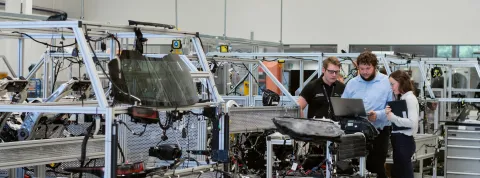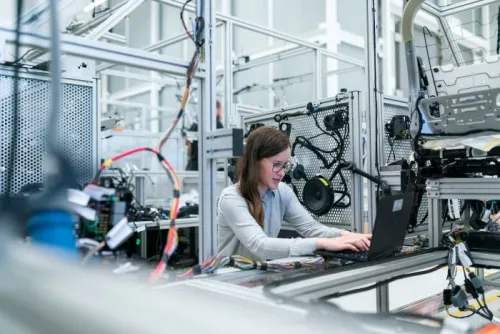
The growth of AI will not destroy jobs, it will transform them
-The experts at EAE Business School highlight that some of the countries with the most automated robots per capita in the world, such as Japan and South Korea, have the lowest unemployment rates
The report underlines the importance of creating an optimal environment for generating new jobs to replace old ones
- The applications of Artificial Intelligence in the different sectors are extremely broad and varied. EAE’s report analyses their impact in different areas
-Future development will revolve around Generative Artificial Intelligence (GAI), which focuses on creativity and the capacity to generate new, original content
Artificial Intelligence has emerged as a powerful tool that is profoundly transforming our society, from medical care right through to education, culture and art, and from security to business and any other area of modern life. To analyse the trends in this highly contemporary sector, EAE Business School, owned by Planeta Formación y Universidades, has published a report entitled Artificial Intelligence: The Potential and Challenges of a Transformative Technology. The authors of the report are the lecturers Pau Sabaté, Alex Gómez Meneses and Aleix Ruiz de Villa.
The report emphasizes that all the experts agree that on the importance of analysing how Artificial Intelligence affects people’s day-to-day lives, the risks it poses and how a sustainable ecosystem can be established for its proper use and development. One of the issues of the greatest concern in this respect is the possible loss of jobs. “The problem is not a matter of losing jobs, but rather of creating an optimal environment for other new jobs to be generated. Paradoxically, some of the countries with the most automated robots per capita in the world, such as Japan, South Korea and Germany, have the lowest unemployment rates”, explained the lecturer and author of the report, Pau Sabaté. “The high level of digitization in these countries does not reduce the number of jobs and they even rank in the top 10 industries in terms of job generation”, added the lecturer.
Another issues that raises concerns, according to the EAE report, are the possible inequalities and misuse that may be generated by Artificial Intelligence. “We have to be able to steer AI towards fulfilling its purpose, maximizing the opportunities that it generates and minimizing the risks it poses”, emphasized Sabaté.
The report also underlines that another key aspect to bear in mind when working with Artificial Intelligence is that we are still “a very long way” from building anything that actually has intelligence. “AI is a system that simulates having knowledge but that, in reality, doesn’t understand anything and simply applies responses based on historical data”.
AI: TRANSFORMING ALL SECTORS
The applications of Artificial Intelligence in the different sectors are extremely broad and varied. EAE’s report analyses their impact in different areas. “The technique that has had the greatest impact in Artificial Intelligence in the last few years is neural networks, now commonly referred to as Deep Learning, which has enabled the development of models such as the popular ChatGPT”, explained Pau Sabaté.
In the communication sectors, virtual assistants such as Siri, Alexa, Google Assistant and more recently, ChatGPT, are chatbots trained to hold conversations or give answers to questions made orally or in writing, giving quick responses and, in the case of ChatGPT, providing a highly innovative experience of smart interaction. “These applications are transforming how we communicate, obtain information, access services and even how we develop contents of all kinds: written, digital, corporate, educational, cultural, etc.”, added the lecturer Alex Gómez Meneses.
The impact on education of a tool that answers questions is also very significant. According to the report, ChatGPT was put to the test by taking the latest university entrance examinations and it passed, with clear mistakes, but equivalent to several hours of study in just a matter of seconds. “With this in mind, there is an urgent need to adapt the system to integrate these tools in the learning process”, emphasized Gómez Meneses.
Another field in which AI will have a widespread impact is entertainment and culture. The recommendation algorithms driven by Artificial Intelligence make suggestions of movies, TV programs, music and books based on personal tastes and preferences, focusing either on the user’s sociodemographic profile or their prior viewing.
EAE’s report stresses that AI will not only affect these industries, but also may other areas, such as healthcare and transport, among others. “Each of these industries must analyse in depth the benefits and risks that AI poses and prepare the optimal environment and ecosystem, including regulations and guidelines for the proper use of Artificial Intelligence”, explained Aleix Ruiz de Villa, one of the authors of the report.
AI IN THE LEGAL AND REAL ESTATE SECTORS
The applications of AI analysed in the report include the real estate sector. “AI plays a crucial role in the management, automation and simplification of commercial processes in the real estate sector”, explained Marta Costales, the CEO of MC Property “Machine learning algorithms can analyse huge volumes of data, such as price trends, property characteristics and demographic data to identify patterns and predict demand and the value of properties”, added Costales. Moreover, the CEO of MC Property highlighted that AI can optimize the selling process by streamlining repetitive tasks and improving operational efficiency, or by analysing legal and financial documents, accelerating due diligence processes and reducing human error.
With respect to the legal sector, Vyctorya Lima e Silva, the CEO of Findiur, explained that “Artificial Intelligence has come to revolutionize the legal sector”. According to the executive, “AI can help both small and large firms by automating processes such as small claims, optimizing information search, creating legal deeds in seconds, easily finding documents in the firm’s own databases, etc.”.
THE NEW REVOLUTION: AIG
The report by EAE Business School also examines the different technical variables within AI and, in particular, the new variant that has made the greatest advances in recent years: Generative Artificial Intelligence (GAI). Artificial Intelligence refers to the creation of systems or software that, using algorithms and data processing techniques, can perform tasks, learn and make decisions or undertake actions. In contrast, Generative Artificial Intelligence (GAI) is a specific subfield of AI that focuses on the capacity to generate new, original contents. “The key difference between the two is the end goal: while traditional AI primarily strives to solve problems, GAI focuses on creativity and the capacity to generate new, original content that can be used in various fields”, explained Sabaté.
GIA is based on advanced machine learning techniques, such as generative adversarial networks (GAN) and generative language models, which learn to produce content based on training data (large amounts of information from which patterns and characteristics can be learned).
Moreover, NLP (natural language processing) is another branch of Artificial Intelligence that has also generated a lot of interest, focusing on the interaction between computers and human language. “The aim is to enable machines to understand, interpret and generate language in a similar way to human beings”, explained Alex Gómez Meneses.
NLP uses a combination of techniques and algorithms that enable machines to learn patterns and rules based on huge sets of data. “The practical applications of NLP are more commonplace than we may imagine. For instance, chatbots on service company websites, voice-based virtual assistance such as Siri and Alexa, proofreading and translating documents to multiple languages, like Deepl, or other applications such as Clara Labs that programs and schedules meetings”, concluded Gómez Meneses.
